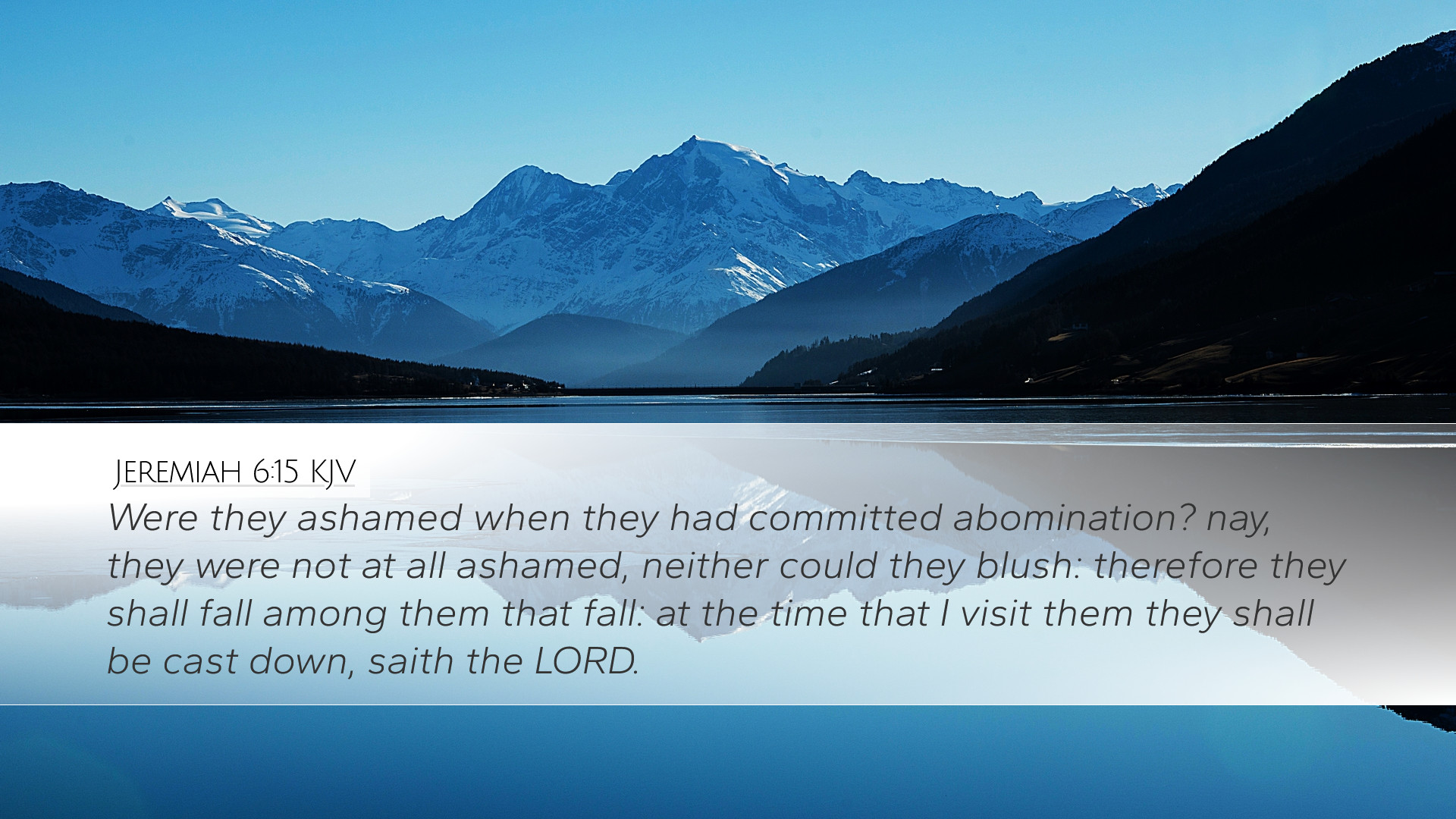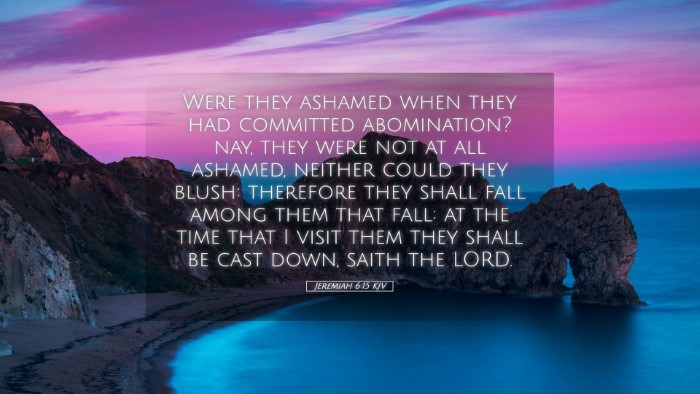Commentary on Jeremiah 6:15
Verse Text: “Were they ashamed when they had committed abomination? nay, they were not at all ashamed, neither could they blush: therefore they shall fall among them that fall: at the time that I visit them they shall be cast down, saith the LORD.” (Jeremiah 6:15, KJV)
Introduction
Jeremiah 6:15 serves as a poignant indictment against the spiritual condition of the people of Judah. This verse captures the essence of the moral decay that pervaded society and provides rich material for reflection and analysis. Public domain commentaries by Matthew Henry, Albert Barnes, and Adam Clarke offer profound insights into the implications of this verse for contemporary readers, making it a significant subject of exploration for pastors, students, theologians, and Bible scholars.
Contextual Background
The Book of Jeremiah is set during a period of great national crisis in Judah, as the Babylonian threat loomed large. Jeremiah, often referred to as the ‘weeping prophet,’ was called to deliver God's messages of warning and judgment. The moral failures of the people, particularly their indifference to sin and lack of repentance, are central themes throughout the text.
Exegesis of Jeremiah 6:15
This verse is a clear reflection of the people's hardened heart. They are not only guilty of committing abominations—grave moral and spiritual failures—but also lack the shame typically associated with such conduct.
Absence of Shame
- Matthew Henry: Henry highlights the absence of shame as a significant indicator of a society estranged from God. He notes that true repentance usually involves a sense of guilt and a desire to turn away from wrongdoing. The inability to blush reflects a deep-seated rebellion against God and a loss of moral compass.
- Albert Barnes: Barnes elaborates on the idea of societal normalization of sin. He argues that when people commit abominations without shame, it signifies that their moral sensibilities have been dulled. This moral insensitivity is indicative of a larger spiritual crisis that can lead to inevitable judgment.
- Adam Clarke: Clarke points out that shame can be a gift from God, leading to repentance and ultimately restoration. The fact that the people do not feel shame suggests they have crossed a threshold into a state of reprobation, where they no longer recognize their sinfulness.
The Consequences of Sin
The latter part of the verse speaks to the consequences of their moral failures. God's declaration that they “shall fall among them that fall” indicates a coming judgment.
- Matthew Henry: Henry posits that this “fall” refers to the impending capture and exile that the people will face. He emphasizes that God's patience has its limits and that the consequences of persistent sin will ultimately lead to divine retribution.
- Albert Barnes: According to Barnes, the phrase “shall fall among them that fall” can be interpreted as a warning of their being caught in the same judgments that befall others. This illustrates the principle that communal sin brings about communal judgment.
- Adam Clarke: Clarke provides a more individualized approach, suggesting that while there is a collective aspect to judgment, each person is responsible for their actions. The time of visitation signifies a moment of accountability where God will address the disobedience of His people.
Theological Implications
Several theological implications emerge from Jeremiah 6:15, relevant for contemporary application.
- Human Responsibility: The passage highlights the theme of human responsibility in the face of divine warning and judgment. God gives individuals and communities the opportunity to repent and turn from their ways, but the choice lies with them.
- Divine Justice: The certainty of judgment is a vital theological concept underscored in this verse. It serves as a reminder that God is sovereign and just; He will not overlook sin forever, and His justice will ultimately prevail.
- The Need for Repentance: In an age of relativism, the call to recognize sin and its consequences remains crucial. Pastors and theologians can use this verse to foster an understanding of the necessity for genuine repentance and the restorative power of God’s grace.
Practical Applications
The insights derived from Jeremiah 6:15 and associated commentaries urge contemporary believers to maintain a posture of humility and awareness regarding their spiritual states.
- Self-Examination: Individuals are encouraged to engage in regular self-examination, allowing the Holy Spirit to illuminate areas of compromise and sin.
- Community Awareness: Churches should be proactive in addressing moral issues within their communities, fostering an environment where accountability and restoration can occur.
- Teaching on Judgment: Educators and pastors should teach about the nature of God’s justice alongside His mercy, emphasizing how both are essential to a holistic understanding of God’s character.
Conclusion
Jeremiah 6:15 stands as a stark reminder of the dangers of spiritual apathy and moral decay. The observations of esteemed commentators such as Matthew Henry, Albert Barnes, and Adam Clarke enrich the understanding of this verse, providing invaluable insights for all who seek to grasp the depth of God's message through the prophet Jeremiah. As we reflect on this verse, may we be inspired to pursue righteousness and instill a culture of repentance in our hearts and communities.


